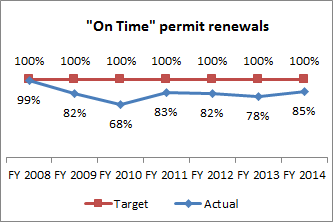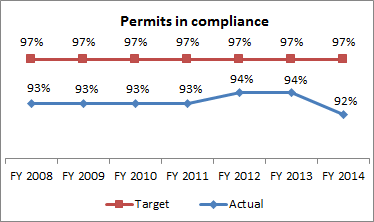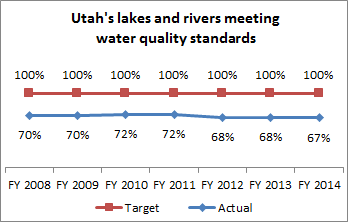The mission of the Division of Water Quality is to protect public health and all beneficial uses of water by maintaining and enhancing the chemical, physical and biological integrity of Utah's waters.
During the 2015 General Session, the Legislature appropriated for Fiscal Year 2016, $10,532,400 from all sources for Water Quality. This is a 1 percent reduction from Fiscal Year 2015 revised estimated amounts from all sources. The total includes $3,117,400 from the General/Education Funds, an increase of 2.9 percent from revised Fiscal Year 2015 estimates.
In addition to statewide compensation and internal service fund cost increases, the following appropriation adjustments were made during the 2015 General Session:
On Time Ground Water Permit Renewals
Surface and ground water permits have a 5-year life span that requires permit renewal. The graph below measures the percentage of "on time" permit renewals. Surface water permit renewals have been hampered by regulation changes at the federal level that have seen agricultural permits litigated multiple times resulting in states, including Utah, waiting to see what the final federal regulations will be prior to promulgating state rules.

Surface and Ground Water Permits in Compliance
Surface and ground water discharge permits include detailed requirements including compliance with effluent limits or ground water protection levels, monthly and quarterly effluent or ground water sampling, reporting and other performance measures. This measure reports the percentage of these permits that are operating in compliance with all state and federal requirements.

Lakes and Rivers Meeting Water Quality Standards
The purpose of this measure is to assess the water quality of Utah's rivers and lakes to see if they are meeting their standards established to protect beneficial uses. These analyses are conducted on a biennial basis due to EPA requirements, which is probably too short of a period for measurable trends. The measure changes whenever water quality standards or assessment methods change, which happens frequently (this is the reason for the recent decline). The division is developing an overall water quality index that will be more useful in establishing water quality status and trends in our lakes and streams.

Other Water Quality Performance Measures
In addition to the key performance measures listed above, the division reported the following performances measures for FY 2014:
- Completed CAFO permitting after three years of stakeholder involvement
- Received approval for the Echo/Rockport Reservoir TMDL
- Received approval for the Colorado River selenium TMDL
- Completed the watershed plans for the Weber and Duchesne Rivers
- Revised and submitted the Nonpoint Source Pollution Management Plan
- Awarded $800,000 of state and $3 million of Red Butte Creek funding for NPS projects
- Initiated and completed rulemaking on eight different water quality rules
- Closed loans on $15.2 million of water quality projects
- Issued 28 construction permits for water pollution control projects
- Prevailed in the Supreme Court's ruling on the U.S. Oil Sands ground water matter
- Completed the $5.5 million settlement agreement on the Willard Bay diesel spill
- Developed the MOU with the Utah Department of Health on laboratory services
- Implemented the 401 Water Quality Certification program
- Established a Quality Assurance Plan for GSL toxicity testing
The major functions of the division include the following:
- establish water quality standards that protect the beneficial uses of Utah's waters;
- report biennially on the quality of Utah's water;
- monitor and assess the quality of lakes, streams, and groundwater;
- review plans for wastewater treatment and disposal systems;
- manage the underground wastewater disposal program and approve plans for large systems;
- develop and implement water quality management plans to protect Utah waters for drinking water, recreation, fishing, agriculture, and industrial uses;
- manage the wastewater loan and grant programs;
- issue and enforce permits for facilities discharging wastewater to surface waters and to ground water;
- manage the federal Underground Injection Control (UIC) program that discharge wastes into the subsurface via wells;
- manage the federal biosolids (municipal sewage sludge) permit program;
- manage the federal pesticide permitting program;
- implement watershed protection strategies and projects;
- manage the storm water program;
- manage the non-point source pollution control program;
- conduct studies and develop programs for abating water pollution;
- issue water quality certifications on federal activities; and,
- manage the wastewater operator certification program.
This division is divided into seven sections. Below is a brief description of the functions of each section:
Engineering Section
This section administers the state and federal loan/grant programs to fund high quality wastewater projects, manages the Utah Wastewater Operator Certification Program, and provides technical assistance to communities to better operate their wastewater systems.
It also conducts engineering plan reviews and issues construction permits for municipal and industrial water pollution control projects and provides technical assistance. The section also conducts operations and maintenance inspections and evaluations of all existing and newly constructed water pollution control projects.
The Division of Water Quality is responsible to administer the Utah Wastewater Project Assistance Program. This program provides financial assistance to communities and individuals to meet their water quality needs.
Funding for FY 2016 for water quality loans and grants is expected to be $22,422,000:
- $3,587,000 - designated sales tax;
- $7,000,000 - federal funds; and,
- $11,835,000 - loan payments (principal, interest, and fees).
UPDES Engineering Section
This section is responsible for developing, implementing, and coordinating the engineering review and permit issuance of the Utah Pollutant Discharge Elimination System (UPDES) and Industrial Pretreatment programs. The UPDES program regulates point source wastewater discharges from municipal, industrial, federal and agricultural facilities. The section also administers the federal Biosolids Permit Program (by encouraging the safe and beneficial use of treated municipal sewage sludge), and the federal Pesticide Permitting Program (by encouraging safe application of pesticides and herbicides by large appliers).
UPDES Inspection/Enforcement/Storm Water Section
This section is responsible for the inspections of UPDES facilities and any necessary enforcement actions as a result of documented noncompliance. The Storm Water Program covers construction, industrial, and municipal storm water issues.
Water Quality Management Section
This section updates water quality standards to protect beneficial uses, and conducts statewide water quality assessments, to determine the quality of the state's lakes, reservoirs, and streams. This section also conducts water quality studies to help establish standards that are protective of Utah waters.
Ground Water Protection
This section develops, implements, and coordinates the Utah Ground Water Quality Protection and the Underground Injection Control (UIC) Programs. This section issues and enforces ground water permits and UIC permits. The section also assists local governments to develop ground water protection programs to compliment land use planning.
Monitoring Section
This section is responsible for conducting chemical, physical, and biological monitoring of surface and ground waters in the state and effluent discharges to ensure compliance with permits and ambient water quality standards. This section also produces the biennial Integrated Report on the quality of Utah's waters.
Watershed Protection Section
This section manages the non-point source pollution control program and is responsible for developing and implementing, through local watershed groups, water quality plans which restore impaired waters so they may again fully support their beneficial uses and meet state water quality standards.
COBI contains unaudited data as presented to the Legislature by state agencies at the time of publication. For audited financial data see the State of Utah's Comprehensive Annual Financial Reports.